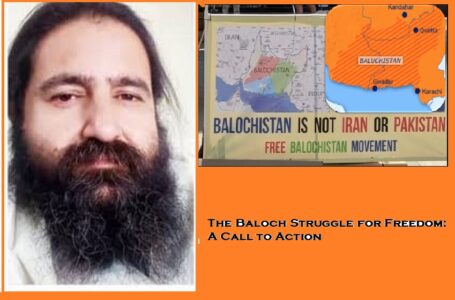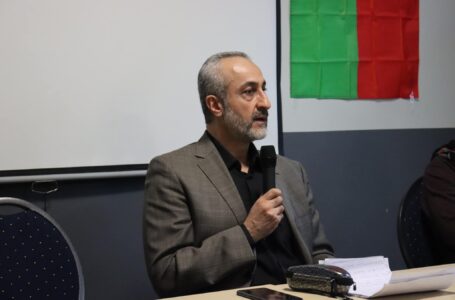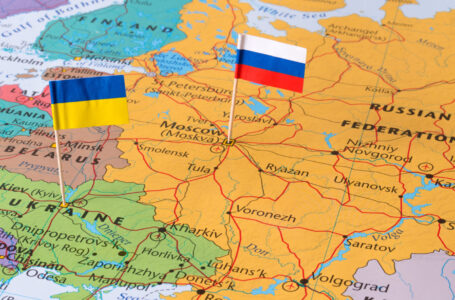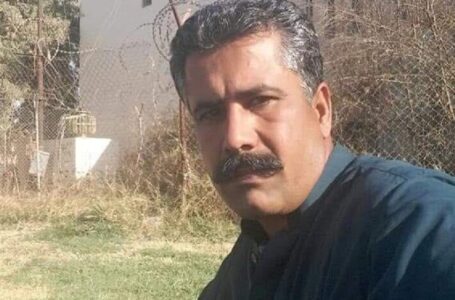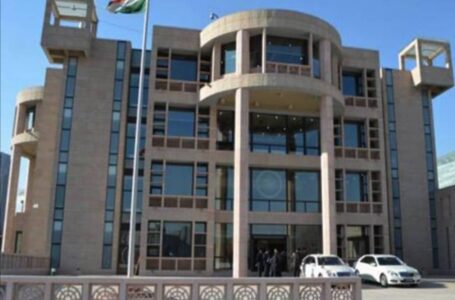Indian State Should Focus on Unconventional Methods: Jamal Nasir Baloch
Troubled America, Confused Pakistan and the Blood bathed Afghanistan

By Hafeez Hasanabadi – Translated by Archen Baloch
One thing is certain. Americans and their allies know that Pakistani intervention in Afghanistan and its vested interests in this country are the main issues that still remain unresolved even after killing and displacing millions of people. But regrettably, while each time they attempt to resolve the issue, the most important thing is ignored as a secondary matter. That is why every effort results in failure. The US Taliban negotiations, which began last year and ended this year, are the resultants of that ignorance.
At the beginning of [US-Taliban] negotiations, I testified in my more than half a dozen articles that these talks will produce no results, because this time, the United States has repeated the past two mistakes from the beginning. First, it didn’t take into confidence its ally, the Kabul government about negotiations with the Taliban at the demand of the Taliban on Pakistan’s behest. Secondly, it overlooked Pakistan’s position as the mastermind behind the Taliban.
America’s Trouble: America’s difficulties are at their worst when viewed from the perspective of Afghanistan’s problems, but for this, the United States is the one to be responsible for its failure because they didn’t study the Soviet Union’s failure before entering Afghanistan and started a step back from the point where the Soviet Union left Afghanistan. The Soviet Union made two mistakes by not moving the Afghan war into Pakistan. Secondly, it didn’t support Baloch independence movement inside Pakistan with diplomatic, military and economic support which could have been a strong ally.
Afghan and Soviet officials wanted to see the Baloch to be mobilized against Pakistan as a force that could have forced Pakistan someday to bring the Mujahedeen to the negotiating table but could not make any decision about their demand for complete independence. It was the main reason that Sardar Khair Bakhsh Marri avoided starting an all-out war against Pakistan. On some important occasions, this scribe was also privileged to be present with Sardar Marri during meetings with Afghan and Russian officials and he ignored their talks and which I have mentioned in some of my previous articles.
But the US, instead of considering Pakistan as the main culprit of war in Afghanistan, declared it as an ally like asking the cat to guard the raw meat. So, being close to America and learning about every plan of the United States, crafty Pakistan devised its counter plans and rendered American plans to utter failure.
By the virtue of this alliance, America, despite having the advantage of 21st Century’s advanced intelligence and surveillance power, was hoodwinked into lengthy talks with Mullah Umer’s representatives in capital to capitals. Osama Bin Laden was hiding in Abbottabad for years and no one knew. Mullah Akhtar Mansoor was having a lucrative business on Pakistani passports and travelled around the world. Quetta Shura planned the murder of US troops and its allies from Quetta. UN-designated terrorist Hafiz Saeed, Dawood Ibrahim, Masood Azhar and dozens of their affiliate terrorists groups, continue their activities in Pakistan freely and engaged in fundraising campaigns and openly public recruit human sources for theirs terrorist activities all over Pakistan.
Of course, countless such things show that US officials are facing the worst misunderstandings about their so-called ally – Pakistan’s – sincerity and seriousness about the fight against terrorism.
A humble question to brainy American elites is that if Pakistan was doing all that [double crossing Americans and rest of the West] and doing it as a coalition partner, then for which hope or illusions the US officials have repeatedly stated that Pakistan was their ally in the fight against terrorism? Is it not time to review the role of Pakistan as an ally from another angle and if it is an ally then what is the hostility for?
Pakistani Confusion and its Duplicity: In the context of the new global situation, in the face of difficulties, beleaguered Pakistan is considered one of the loneliest countries in the world; its longtime friend, the United States is angry. Russia does not trust it and from China’s behaviour, it seems that it is starting to release that it’s been deceived [so it also does not trust Pakistan any longer because of its dishonesty].
Pakistan is plagued by internal political and economic crises; its rulers have based its internal and external policies on duplicity. Pakistan signed a $ 60 billion deal of CPEC with China and handed over the precious Baloch properties to them at a throw-away exchange of value. They sidetracked China despite spending eighteen billion dollars on this project. Islamabad deliberately consolidated Saudi Arabia, United Arab Emirates as stockholders in Gwadar CPEC project without consulting China.
It was promised by both countries that the Pak-China agreements would not be opened to anyone, but all information on financial agreements with China, including the CPEC were shared with IMF which angered China. Pakistani authorities did this because they know that if debts of Balochistan’s Gwadar related projects led Pakistan into China debt-trap, then the swarming population of Punjab will die in hunger.
Pakistan had assured Russia that with the help of Taliban it would help Russia to take revenge on the United States for the Soviet Union defeat in the region along with the defeat of Al-Qaeda and ISIS. Later, the Russians found out that ISIS and al-Qaeda had different structures in other parts of the world, but in Pakistan, they’re two sides of ISI’s same coin. Sometimes ago, the Russian Defense Minister stated that the presence of terrorist groups on the Pak-Afghan border cannot be ignored. There must be someone who is supporting them to roam freely in the area without any hindrance. This clearly shows that Russia does not accept the dual policies of Pakistan in the region, albeit it is giving Pakistan a chance to clear up its messes.
However, Pakistan cannot stop its dirty games, because it has a grandiose understanding with terrorist organizations such as Taliban, Al-Qaeda and other Islamic terror organizations that they will establish the Caliphate in Afghanistan after expelling the infidels (America, Russia and India). The gate to Europe will open up for them from Central Asia through Russian for their Jihadist expeditions.
They will launch Ghazwa-e-Hind through Kashmir route in India. The Jihadist groups – ISIS, Al-Qaeda, Lashkar-e-Taiba, Jaish-e-Mohammed – that the United States, Russia and the rest of the civilized world want to eliminate, In fact, are the collective forces out of which Pakistan wants to farm the Caliphate under its leadership. Unfortunately, this disgusting and unbelievable thought is behind all the bloodshed that does not allow Pakistan to stop the bloodshed in Afghanistan, despite all the economic pressure and political isolation.
Pakistan’s new plan for the bloodbath in Afghanistan: The stalemate of US Taliban talks went counterproductive to Pakistan’s wish list, as it seeks US’s favour under these negotiations, thereby reducing the external and internal pressure so that it could destroy Afghanistan and disturb India in Kashmir with more death and destruction in the region.
The precise identification of Pakistan’s crooked plan and the solid stand by Ashraf Gani, Afghan civil society, Afghan Army, the NDS, and other well-wishers helped the United States to understand Pakistani tactics, which led to the suspension of talks with Taliban.
Under the guise of negotiations, Pakistan had planned to force suspend the presidential elections in Afghanistan in order to pave the way for anarchy with a planted caretaker government. This could have renewed the war and forced America to be dependent on Pakistan all the more, and a parasitic caretaker government in Kabul would have been at the mercy of Pakistan and all their affairs would have been settled between Washington and Islamabad.
Here the question arises as to why Ashraf Ghani is not acceptable to Pakistan as an Afghan head? The answer is very clear because Pakistan’s negative and hypocritical attitude irreversibly disappointed him, despite the fact that he was the first Afghan President who visited the GHQ in 2014, he attached high expectations that he will convince Pakistani rulers for a peaceful resolution of the Afghan crisis.
After resuming power, he came to Pakistan with wishful thinking that Pakistan will help him to end the Afghan crisis, Pakistan disappointed him and now he knows Pakistan very well. For Pakistan, Ashraf Ghani and his new team are in no way acceptable because they have not only been very clear about Pakistan but also they’ve now adopted such a strategy that they will surely win and Pakistan’s terrorism is surely doomed to failure in the long run.
Externally, Pakistan is very nervous about Afghanistan’s stability and clear position in front of the United State. Internally it is in the grip of a huge turmoil and facing unbearable external pressures. In order to reduce the pressures, it will try to bring internal stability and restage the drama of US Taliban talks, most likely to resume in a few months, but this time around both Pakistan and the Taliban will face serious difficulties to negotiate.
How to make sure that these talks bring about a real ceasefire? How to acknowledge that ISIS, Al-Qaeda and Taliban are different entities? Seemingly, they’re isolated, but wherever bombings or operations occur against Taliban, al-Qaeda’s leader is killed in the same compound with the Taliban.
Third, currently three major forces, the US, Afghan forces, the Taliban are fighting against ISIS and Al-Qaeda, yet their number is growing instead of decreasing. What will happen if the Taliban later dissolve the Afghan Army and fight against them alone? Will they? Fourth and most importantly, China and Russia will not be as active as they were before, because, until the suspension of the talks, Pakistan and the Taliban did not succeed in showing them a mechanism how they could bring peace in Afghanistan after the United States’ departure.
Isn’t it highly likely that a section of the Taliban, like the Gulbuddin, would infiltrate the government ranks and the others will wage a new war once again? Their intention is to see America go, but they do not look forward to an unpredictable war in their neighbourhood. They are afraid that should the situation turn into a way that terrorism and drug trafficking spread everywhere by the government’s patronization.
If the US pressed to seek the answers to such questions by the beginning of the new negotiations, it is certain that there will be no negotiation, and the army would pave the way for the martial law and a drama will be staged to hand over the power to America as usual.
And then the US will be one to guarantee everything. This will again bring the Taliban and America on table talks and the dollars starts showering on Pakistan like Zia and Musharraf era. The relation will be normal between the two. If things can be done without martial law, they will put all the blames of Pakistan’s disgrace and isolation on a civilian government.
In short, success comes only when the United States takes the Afghan government in full confidence and holds Pakistan responsible for Afghanistan’s instability and forces it to negotiate with Afghanistan for peace because all terrorist organizations in Afghanistan are on ISI’s parole. Without Pakistan’s help, all these organizations would not be able to continue their activities for even four months. Because of this, those Taliban elements, within the Taliban, who want to see an Afghan government- free of Pakistan’s influence -can not talk with the Afghan government
If the United States sought to talk with Pakistani civil government or military, without holding it responsible for all the messes, nothing can be gained by America and Afghanistan, it rather gives Pakistan a space to replenish its terrorist organizations. They will turn around with more power and intensity in their death and destructions campaign against the Afghan nation.

